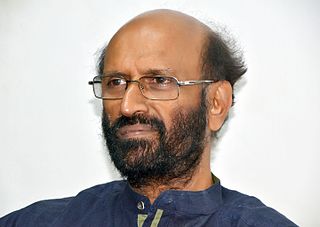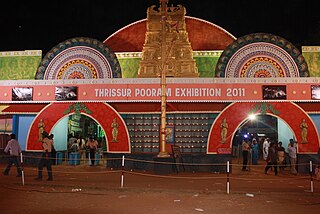The Maharashtra Pollution Control Board implements a range of environmental legislation in the state of Maharashtra, India. The MPCB functions under the administrative control of Environment Department of the Government of Maharashtra.
The Government of Gujarat constituted the Gujarat Pollution Control Board (GPCB) on 15 October 1974 with a view to protect the environment, prevent and control the pollution of water in the State of Gujarat, that occupies a prominent niche in progressive and industrial development of the country. The Board has been over the years entrusted with the Central Acts and relevant Rules for pollution control as notified thereof from time to time.

The Ministry of Environment, Forest and Climate Change (MoEFCC) is an Indian government ministry. This ministry is headed by Secretary Rank senior most IAS officer. The ministry portfolio is currently held by Bhupender Yadav, Union Minister of Environment, Forest and Climate Change.

Travancore Titanium Products Ltd (TTP) is the leading manufacturer of anatase grade titanium dioxide in India. The company was incorporated in 1946 at Thiruvananthapuram, the capital of Kerala, India on the initiative the then Travancore King, Sree Chithira Thirunal.

The All India Carrom Federation (AICF) is India's national sport federation for the indigenous game of carrom, sanctioning six to seven national-level tournaments per year. It is India's representative body in the International Carrom Federation. The AICF has 15 regional and 28 state subnational affiliate institutions, the largest of which is the Maharashtra Carrom Association, further subdivided into local organisations.

The environment of India comprises some of the world's most biodiverse ecozones. The Deccan Traps, Gangetic Plains and the Himalayas are the major geographical features. The country faces different forms of pollution as its major environmental issue and is more vulnerable to the effects of climate change being a developing nation. India has laws protecting the environment and is one of the countries that signed the Convention on Biological Diversity (CBD) treaty. The Ministry of Environment, Forest and Climate Change and each particular state forest departments plan and implement environmental policies throughout the country.

There are multiple environmental issues in India. Air pollution, water pollution, garbage, domestically prohibited goods and pollution of the natural environment are all challenges for India. Nature is also causing some drastic effects on India. The situation was worse between 1947 through 1995. According to data collected and environmental assessments studied by World Bank experts, between 1995 through 2010, India has made some of the fastest progress in addressing its environmental issues and improving its environmental quality in the world. However, Pollution still remains a major challenge and opportunity for the country.

Dr. Ekbal Bappukunju is a public health activist, a neurosurgeon, and an academic in Kerala, India and is serving as a member of the Kerala State Planning Board since 2016. He was the Vice-chancellor of the University of Kerala during the period 2000–2004.He completed his pre-degree from St. Berchmans College Changanacherry. He was a member of the Kerala State Planning Board from 1996 to 2000, during which he played a vital role in People's Plan Campaign, a decentralization move by the Government of Kerala.
Andhra Pradesh Pollution Control Board is a statutory organisation of Government of Andhra Pradesh to implement Environment protective laws and rules.

Government Law College, Thiruvananthapuram also known as GLC Trivandrum is one of the institutions imparting graduate and post graduate legal education in India. Affiliated to the University of Kerala, it is the second law college in Kerala and one of the oldest law colleges in India. It was established in 1875 by the then Maharajah of the erstwhile Princely State of Travancore. Notable alumni of the college including Judges of Supreme Court of India such as Justice Fathima Beevi, judges of High Courts, politicians, and academicians such as N. R. Madhava Menon.

Kerala Public Works Department (KPWD) is a department under the government of the state of Kerala, India. It manages the construction and maintenance of civil structures owned by the government viz; government buildings, government owned hospitals, roads, bridges etc. The KPWD was formed in 1956 following reorganization of states.

All India Agricultural, Industrial, Educational and Cultural Exhibition or commonly called the Thrissur Pooram Exhibition is an exhibition organised jointly by Paramekkavu Bagavathi Temple Devaswom and Thiruvambadi Sri Krishna Temple Devaswom, ahead of Thrissur Pooram in Thekkinkadu Maidan in Thrissur city. It is usually conducted over a period of 40 to 50 days during the Thrissur Pooram.The exhibition is the largest in Kerala in terms of attendance and floor space.

The Central Pollution Control Board (CPCB) of India is a statutory organization under the Ministry of Environment, Forest and Climate Change (Mo.E.F.C.C.). It was established in 1974 under the Water Act, 1974. The CPCB is also entrusted with the powers and functions under the Air Act, 1981. It serves as a field formation and also provides technical services to the Ministry of Environment and Forests under the provisions of the Environment (Protection) Act, 1986. It coordinates the activities of the State Pollution Control Boards by providing technical assistance and guidance and also resolves disputes among them. It is the apex organization in country in the field of pollution control, as a technical wing of MoEFCC. The board is led by its chairperson appointed by the Appointments Committee of the Cabinet of the Government of India. The current acting chairman is Shri Tanmay Kumar IAS and the Member Secretary is Prashant Gargava.

Water pollution is a major environmental issue in India. The largest source of water pollution in India is untreated sewage. Other sources of pollution include agricultural runoff and unregulated small-scale industry. Most rivers, lakes and surface water in India are polluted due to industries, untreated sewage and solid wastes. Although the average annual precipitation in India is about 4000 billion cubic metres, only about 1122 billion cubic metres of water resources are available for utilization due to lack of infrastructure. Much of this water is unsafe, because pollution degrades water quality. Water pollution severely limits the amount of water available to Indian consumers, its industry and its agriculture.

The Agency for New and Renewable Energy Research and Technology (ANERT) is a government agency in the Kerala, India. Its mission is gathering and disseminating knowledge about renewable energy, energy conservation, and rural technology. The agency was established in 1986 with its headquarters at Thiruvananthapuram.

The Telangana Pollution Control Board is an ministry of Government of Telangana. It is body of the Department of Health and Family Welfare, Government of the State of Telangana, India. The board is charged with enforcing laws related to environmental protection.
Dilip K. Biswas is an Indian environmentalist and former chairman of the Central Pollution Control Board and Delhi Pollution Control Committee. He was a member of the panel which conducted ecological studies on Silent Valley and checked the feasibility of a hydro-electric project in the area, eventually recommending against project, leading to the declaration of Silent Valley as a National Park. He is the author of Implementation of the Clean Development Mechanism in Asia and the Pacific: Issues, Challenges, and Opportunities, a report published by the United Nations as a guideline for the implementation of the Clean Development Mechanism (CDM), prescribed by Kyoto Protocol. His contributions are also reported behind the drafting of the environment management laws in Lucknow, the capital city of the Indian state of Uttar Pradesh. The Government of India awarded him the fourth highest civilian honour of the Padma Shri, in 2007, for his contributions to science and technology.
Indian environmental law concerns the law and policy of India concerning the protection of the environment, measures taken to reverse climate change and achieve a zero carbon economy.
Haryana State Pollution Control Board was formed as statutory organisation by Government of Haryana in the year 1974 to preserve the wholesomeness of water and prevent water pollution after Government of India legislation of Water Act, 1974. The board was given additional responsibility to prevent Air Pollution from the year 1981 with the enactment of Air Act, 1981 and in general for implementation of Environment laws and rules.












